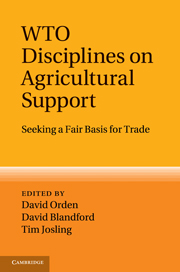Book contents
- Frontmatter
- Contents
- List of figures
- List of tables
- Notes on contributors
- Preface
- List of acronyms
- PART I overview of domestic support issues and WTO rules
- PART II Developed countries: have high levels of support come down?
- PART III Developing countries: will low levels of support rise?
- PART IV Looking forward: can fair markets be achieved?
- 11 The difficult task of disciplining domestic support
- Appendix A Domestic support provisions of the Agreement on Agriculture
- Appendix B Domestic support provisions of the Doha draft modalities
- Index
- References
11 - The difficult task of disciplining domestic support
Published online by Cambridge University Press: 11 April 2011
- Frontmatter
- Contents
- List of figures
- List of tables
- Notes on contributors
- Preface
- List of acronyms
- PART I overview of domestic support issues and WTO rules
- PART II Developed countries: have high levels of support come down?
- PART III Developing countries: will low levels of support rise?
- PART IV Looking forward: can fair markets be achieved?
- 11 The difficult task of disciplining domestic support
- Appendix A Domestic support provisions of the Agreement on Agriculture
- Appendix B Domestic support provisions of the Doha draft modalities
- Index
- References
Summary
When the WTO was launched at the conclusion of the Uruguay Round negotiations its members committed to a new set of disciplines for agricultural domestic support, market access and export competition. It was recognized at the time that the domestic support disciplines were rather porous. Their architecture was consistent with the modest objectives that WTO members had collectively agreed to reduce distortions in world markets. What was uncertain at that point was just how the agreed-upon disciplines would interact with subsequent domestic agricultural policy decisions. In particular, it was not known to what extent the new rules and commitments would motivate countries to shift their policies in the less trade-distorting direction envisioned by the Agreement on Agriculture.
For domestic support the only fixed numerical commitment under the Agreement was to a nominal ceiling (or zero binding) on the sum of certain trade-distorting amounts of support calculated annually in the Current Total AMS. Countries making ceiling commitments set the ceilings at relatively high levels as a result of using a 1986−88 base period with low world prices and high support. By the time the Agreement was signed prices had increased and support moderated, so it was recognized that these commitments provided substantial flexibility. Green box measures in all countries, and certain types of support through development programs in developing countries, were exempt from any ceiling.
- Type
- Chapter
- Information
- WTO Disciplines on Agricultural SupportSeeking a Fair Basis for Trade, pp. 391 - 432Publisher: Cambridge University PressPrint publication year: 2011



